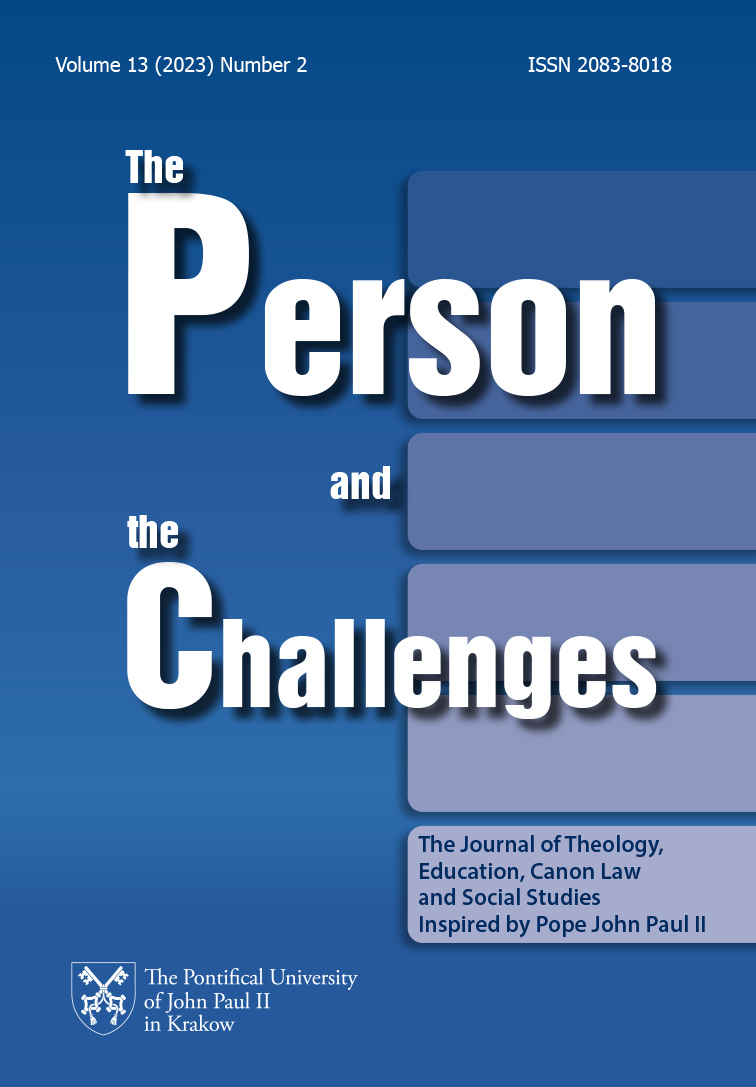Trauma and Spirituality
DOI:
https://doi.org/10.15633/pch.13210Abstract
-
References
Currier J.M., Holland J.M., Drescher K.D., Spirituality Factors in the Prediciton of Outcomes of PTSD Treatment for U.S. Military Veterans, “Journal of Traumatic Stress” 28 (2015), pp. 57–64.
Frechette C.G., Boase E., Defining “Trauma” as a Useful lens for Biblical Interpretation, in: C.G. Frechette & E. Boase (eds.), Bible through the Lens of Trauma, Atlanta 2016, SBL Press, pp. 1–23.
Garber D., Trauma Theory and Biblical Studies, “CurBR” 14 (2015), pp. 24–44.
Giller E., What is Psychological Trauma, http://www.theannainstitute.org/What%20Is%20Psychological%20Trauma.pdf?contentID=88 (26.09.2022).
Good M., Willoughby T., Adolescence as a Sensitive Period for Spiritual Development, “Child Development Perspecitves” 2 (2008) 1, pp. 32–37.
Hill P.C., Pargament K.I., Advances in the Conceptualization and Measurement of Religion Spirituality – Implications for Psysical and Mental Health Research, “American Psychologist” 58 (2003) 1, pp. 64–74.
Janoff-Bulman R., Assumptive Worlds and the Stress of Traumatic Events: Applications of the Schema Construct, “Social Cognition” 7 (1989) 2, pp. 113–136.
Janoff-Bulman R., Shattered assumptions: Towards a new psychology of trauma, New York 1992, Free Press.
Litz B.T., Stein N., Delaney E., Lebowitz L., Nash W.P., Silva C., Maguen S., Moral injury and moral repair in war veterans: A preliminary model and intervention strategy, “Cilinical Psychology Review” 29 (2009) 8, pp. 695–706.
Pergament K.I., The Psychology of Religion and Coping: Theory, Research, Practice, New York 1997, The Guilford Press.
Park C., Religion as a Meaning-Making Framework in Coping with Life Stress, “Journal of Social Issues” 61 (2005) 4, pp. 707–729.
Resick P.A., Calhoun K.S., Posttraumatic stress disorder, in: D. H. Barlow (ed.), Clinical handbook of psychological disorders: A step-by-step treatment manual, New York 2001, The Guilford Press, pp. 60–113.
Shafranske E.P., Malony H.N., Clinician psychologist’ religious and spiritual orientations and their practice of psychotherapy, “Psychotherapy” 27 (1990), pp. 72–78.
Smith S., Exploring the Interaction of Trauma and Spirituality, “Traumatology” 10 (2004) 4, pp. 231–243.
Tadeschi R.G., Calhoun L.G., The Posttraumatic Growth Inventory: Measuring the Positive Legacy of Trauma, “Journal of Traumatic Stress” 9 (1996) 3, pp. 455–471.
Wilson J.P. & Moran T.A., Psychological Trauma: Posttraumatic Stress Disorder and Spirituality, “Journal of Psychology and Theology” 26 (1998) 2, pp. 168–178.
Downloads
Published
Issue
Section
License

This work is licensed under a Creative Commons Attribution 4.0 International License.
Authors who publish with this journal agree to the following terms:
- Authors retain the copyright and full publishing rights without restrictions, and grant the journal right of first publication with the work simultaneously licensed under a Creative Commons Attribution 4.0 International License that allows others to share the work with an acknowledgement of the work's authorship and initial publication in this journal.
- Authors are able to enter into separate, additional contractual arrangements for the non-exclusive distribution of the journal's published version of the work (e.g., post it to an institutional repository or publish it in a book), with an acknowledgement of its initial publication in this journal.
- Authors are permitted and encouraged to post their work online (e.g., in institutional repositories or on their website) prior to and during the submission process, as it can lead to productive exchanges, as well as earlier and greater citation of published work (See The Effect of Open Access).

